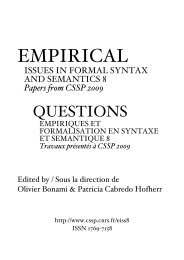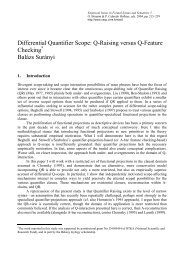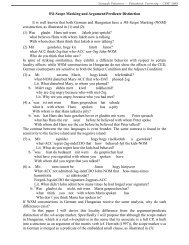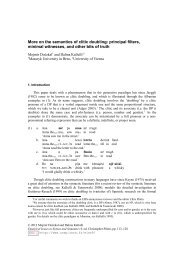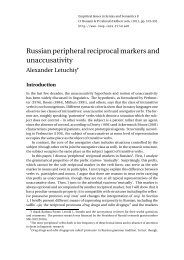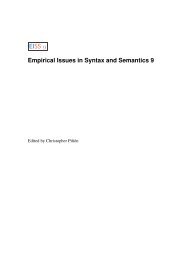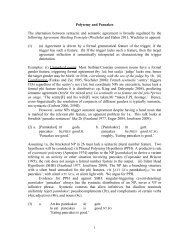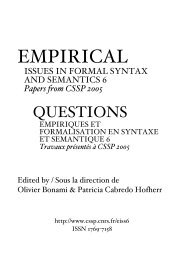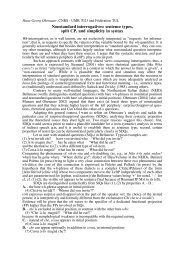Expressive modifiers & mixed expressives - CSSP
Expressive modifiers & mixed expressives - CSSP
Expressive modifiers & mixed expressives - CSSP
You also want an ePaper? Increase the reach of your titles
YUMPU automatically turns print PDFs into web optimized ePapers that Google loves.
<strong>Expressive</strong> <strong>modifiers</strong> & <strong>mixed</strong> <strong>expressives</strong><br />
In his influential work on <strong>expressives</strong>, Potts (2005, 2007b) makes the following two claims:<br />
(1) <strong>Expressive</strong> types are only output types, i.e.: (Potts 2007b: 169)<br />
a.<br />
b.<br />
At-issue content never applies to expressive content.<br />
<strong>Expressive</strong> content never applies to expressive content.<br />
(Potts 2005: §3.5.1)<br />
(Potts 2005: §3.5.2)<br />
(2) No lexical item contributes both an at-issue and a CI-meaning. (Potts 2005: 7)<br />
Against these generalizations, we claim that both (1) and (2) are too strong, since they exclude<br />
attested constructions. We argue that in the end, only (1a) seems to hold. After establishing our<br />
claims, we modify Potts’ (2005) logic L CI to cover the presented examples as well.<br />
<strong>Expressive</strong> <strong>modifiers</strong> In Potts’ (2007b: 183) type system, expressive types are strict output types:<br />
(3) a.<br />
b.<br />
e and t are descriptive types.<br />
ε is an expressive type.<br />
c. If σ and τ are descriptive types, then ⟨σ, τ⟩ is a descriptive type.<br />
d.<br />
e.<br />
If σ is a descriptive type, then ⟨ε, σ⟩ is an expressive type.<br />
The set of types is the union of the descriptive and expressive types.<br />
From this type system, the generalization (1) follows: There are neither expressions mapping from<br />
expressive content to at-issue content nor expressions mapping expressive content to expressive<br />
content. The later generalization predicts that there are no expressive <strong>modifiers</strong>. However, such<br />
expressions can be attested in natural languages. For instance, fucking in (4a) seems to modify<br />
the expressive bastard, and holy modifies the expressive shit in (4b).<br />
(4) a. That fucking bastard Burns got promoted!<br />
b. Holy shit, my bike tire is flat again!<br />
Potts (2007a,b) present as work-around to solve the problem raised for his type definition by<br />
cases like the one in (4a). Instead of giving a intuitive semantic structure for fucking bastard Burns,<br />
in which fucking modifies bastard which is then applies to burns like in (5), Potts (2007a,b)<br />
presents an analysis along the lines of (6), where each expressive item is taken to apply to burns<br />
one after the other, that is, they are treated like non-restrictive <strong>modifiers</strong>.<br />
(5) burns<br />
•<br />
fucking(bastard)(burns)<br />
fucking(bastard)<br />
fucking<br />
(bastard)<br />
burns<br />
Daniel Gutzmann — Goethe-Universität Frankfurt— <strong>CSSP</strong> 2009<br />
(6) burns<br />
•<br />
fucking(burns)<br />
fucking<br />
burns<br />
•<br />
bastard(burns)<br />
bastard<br />
burns<br />
Potts then defines the meaning of expressive items in such a way that it somehow models the<br />
observation that fucking intensifies the expressive meaning of bastard. However, this doesn’t work<br />
for cases like (4b), since holy cannot be taken to modify the sentence. This is show by the fact<br />
holy may be dropped but not the expressive shit.<br />
(7) a. Shit, my bike tire is flat again!<br />
b. *Holy, my bike tire is flat again!<br />
Further examples of this kind are provided in constructions in which we have an intensifier<br />
(Schwager & McCready 2009) like absolutely that clearly modifies the expressive and not the<br />
noun that is modified by the expressive. (cf. also Geurts 2007).<br />
(8) a. That absolutely fucking bastard Burns got promoted!<br />
b. *That absolutely Burns got promoted!<br />
We take such kinds of examples as evidence that there are at least some expression in natural<br />
language that map expressive content to expressive content.<br />
Mixed <strong>expressives</strong> The generalization (2) is also too strong as there are clear cases in which an<br />
expression carries at-issue as well as expressive meaning. The most obvious examples are racist<br />
swear words.
Daniel Gutzmann — Goethe-Universität Frankfurt— <strong>CSSP</strong> 2009<br />
(9) Lessing was a Boche. (Williamson 2009)<br />
In the expressive dimension, Boche conveys that the speaker does not like German, thinks of<br />
them as being cruel etc. But crucially, Boche also has a descriptive component: (9) entails that<br />
Lessing was a German (Arguably, that is its truth-conditional content). But L CI does not allow for<br />
<strong>mixed</strong> <strong>expressives</strong> that contribute to both dimensions of meaning. Furthermore, L CI predicts that<br />
the truth-conditional content of (9) is just lessing since applying boche to its argument passes it<br />
up the tree unmodified, but there is nothing left that could be applied to lessing.<br />
(10) lessing<br />
•<br />
boche(lessing) ∶ ε<br />
lessing ∶ e boche ∶ ⟨e, ε⟩<br />
Of course, the truth-conditional meaning of (9) is not Lessing but that Lessing was German. A<br />
further argument is that the contribution of the past tense in (9) have to apply to the descriptive<br />
component since the expressive component cannot be shifted to the past. (For further examples<br />
of <strong>mixed</strong> <strong>expressives</strong>, cf. McCready 2009).<br />
Extension of L CI To account for expressive <strong>modifiers</strong> and <strong>mixed</strong> <strong>expressives</strong>, we extent Potts’<br />
(2005) logic L CI . First, to allow for expressive <strong>modifiers</strong>, we allow for expressive types in the<br />
input. We call these types pure expressive types to distinguish them from the ordinary complex<br />
expressive types, which we call hybrid expressive types. To account for <strong>mixed</strong> <strong>expressives</strong>, we adopt<br />
the type definition in (11f) from McCready 2009.<br />
(11) a. e and t are descriptive types.<br />
b. ε is an expressive type.<br />
c. If σ and τ are descriptive types, then ⟨σ, τ⟩ is a descriptive type.<br />
d. If σ is a descriptive type and τ is a (hybrid or pure) expressive type, then ⟨σ, τ⟩ is a<br />
hybrid expressive type.<br />
e. If σ and τ are (hybrid or pure) expressive types, then ⟨σ, τ⟩ is a pure expressive type.<br />
f. If σ and τ descriptive type and υ is a pure expressive type, then ⟨σ, τ⟩ ◇ ⟨σ, υ⟩ is a<br />
<strong>mixed</strong> type.<br />
To allow for modifying <strong>expressives</strong> inside the semantic parsetree without isolating them, we<br />
introduce a new tree-admissibility condition for pure expressive application (12), which is just<br />
like ordinary truth-conditional application but involves a pure expressive type as the functional<br />
expression (we use a superscribed ε to indicate that the variables range over expressive types.).<br />
The new rule for <strong>mixed</strong> application given in (13) distributes one argument to a descriptive and an<br />
expressive component and the isolates the expressive content from the semantic parsetree.<br />
(12) α(β) ∶ τ ε<br />
(13) α(γ) ∶ τ<br />
•<br />
α(σ ε , τ ε ) β ∶ τ ε β(γ) ∶ υ<br />
α ∶ ⟨σ, τ⟩ ◇ β ∶ ⟨σ, υ⟩<br />
Equipped with these rules and types, we can provide very intuitive semantics for the expressions<br />
discussed above.<br />
References<br />
Geurts, Bart (2007): »Really fucking brilliant«. In: Theoretical Linguistics 33.2, 209–214.<br />
McCready, Eric (2009): »Varieties of conventional implicature. Evidence from Japanese«. Ms. Tokyo:<br />
Aoyama Gakuin University. url: http://semanticsarchive.net/Archive/DdmMWQyM/.<br />
Potts, Christopher (2005): The Logic of Conventional Implicature. Oxford: OUP.<br />
Potts, Christopher (2007a): »The centrality of expressive indices«. In: Theoretical Linguistics 33.2, 255–268.<br />
Potts, Christopher (2007b): »The expressive dimension«. In: Theoretical Linguistics 33, 165–197.<br />
Schwager, Magdalena & Eric McCready (2009): »Intensifiers«. In: DGfS 31. Workshop on <strong>Expressive</strong>s and<br />
other Kinds of Non-truth-conditional Meaning. University of Osnabrück.<br />
Williamson, Timothy (2009): »Reference, inference and the semantics of pejoratives«. In: Almog, Joseph<br />
& Paolo Leonardi, eds. (2009): The Philosophy of David Kaplan. Oxford: OUP, 137–158.<br />
γ ∶ σ



